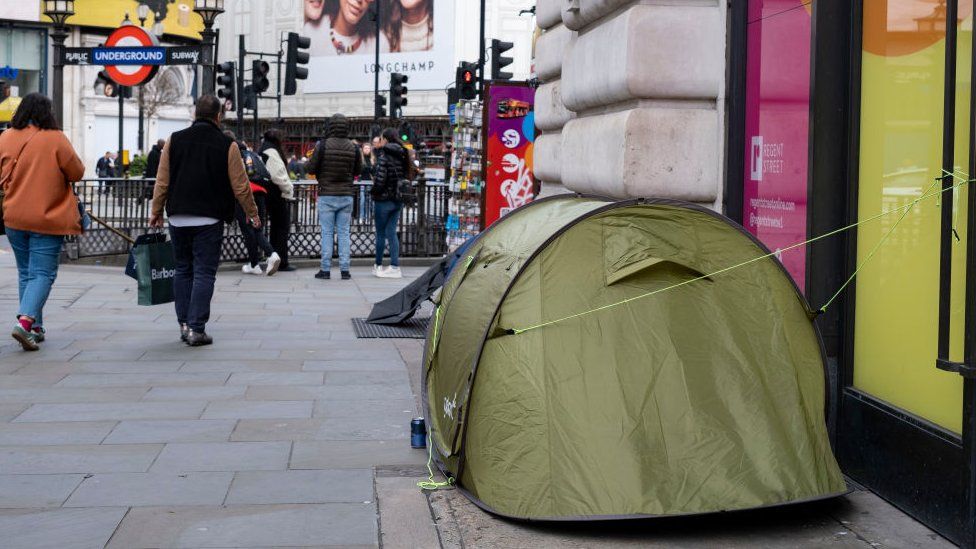ARTICLE AD BOX
 Image source, Getty Images
Image source, Getty Images
By Peter Saull & Jack Fenwick
BBC Politics
Home Secretary James Cleverly is coming under increasing pressure to rethink plans to clamp down on "nuisance" rough sleeping in England and Wales.
The government is expected to make concessions in the coming weeks to try to stave off a backbench rebellion.
Dozens of Conservative MPs are thought to oppose the plans.
Now more than 30 charities have written to Mr Cleverly to warn the plans could see vulnerable women being fined for seeking shelter.
Measures in the Criminal Justice Bill would allow police to move on "nuisance" rough sleepers and, if they do not comply, issue a fine or arrest them.
However, critics have argued the definition of nuisance behaviour is too broad and includes things such as causing excessive noise or smells, as well as being threatening or causing damage to property.
Ministers have been holding talks with potential Conservative rebels seeking to block the plans in Parliament in a bid to find an approach that keeps them on side.
'Nowhere else to go'
Those discussions are expected to resume when Parliament returns from its Easter break next week and the backbenchers are confident there will be some movement.
The Home Office argues the measures will tackle rough sleeping and begging "where it causes damage, disruption, harassment or distress to the public, while avoiding criminalising the genuinely vulnerable".
They are set to replace the 1824 Vagrancy Act, which makes begging and rough sleeping a criminal offence.
However, Tory backbencher Bob Blackman, who has tabled several amendments to the bill, believes the new plans are worse than the 19th-century legislation.
"These people are not there by choice, they are there because they've got nowhere else to go," he told the BBC.
"They should be assisted, not arrested," he added.
Conservative former minister Sir Iain Duncan Smith is among 11 Tories who are publicly backing his proposals, along with opposition MPs.
'Difficult subject'
More Conservative names are expected to be added to the amendments when Parliament returns from its Easter break next week.
About 32 Tory MPs would need to back the proposals in order to win, but it is understood the government is not keen to have a public argument within its own ranks over the topic.
Home Office sources say they do not believe their plans criminalise rough sleeping.
But they want to ensure the police have sufficient powers to deal with aggressive begging.
The legislation was written when Suella Braverman was home secretary and government figures stress the Home Office now has a different person at the top in Mr Cleverly.
An ally of Mrs Braverman's said the "reality is sometimes the government has to make tough decisions to the benefit of the majority".
They said homelessness is a "difficult subject" and "nobody likes talking about it" but you "can't have a situation where shopkeepers have people blocking their doors and are unable to move them on".
The letter, signed by organisations including Crisis, Amnesty UK and the Big Issue, praises government steps to end rough sleeping but argues that elements of the Criminal Justice Bill "undermine" those commitments.
"It could see women, who are disproportionately likely to suffer violence and sexual abuse on the streets, penalised for seeking shelter and safety in well-lit doorways," they write.
"It could see a fine of £2,500 issued to a person carrying an 'excessive smell'."
'Last chance saloon'
A Home Office spokesperson said: "The bill concentrates on behaviour that is anti-social, including causing environmental damage such as with excessive noise or litter. No one will be criminalised for simply having nowhere to live.
"We will continue to engage with stakeholders and parliamentary colleagues in the usual way as the bill passes through parliament."
At least 93 amendments have been tabled to the Criminal Justice Bill, on issues ranging from abortion to gay conversion therapy.
On Tuesday the government announced its own amendment, adopting a Labour policy to create a specific offence of assaulting a shop worker.
The bill has been likened to a "Christmas tree", with its wide scope enabling MPs to attach various issues to it.
With a general election around the corner, one government source said they thought the legislation had become a "last chance saloon" for MPs to propose changes they cared about.
It is not clear when the bill will return to the Commons, but its increasing complexity is thought to be holding it up.

 9 months ago
17
9 months ago
17








 English (US) ·
English (US) ·